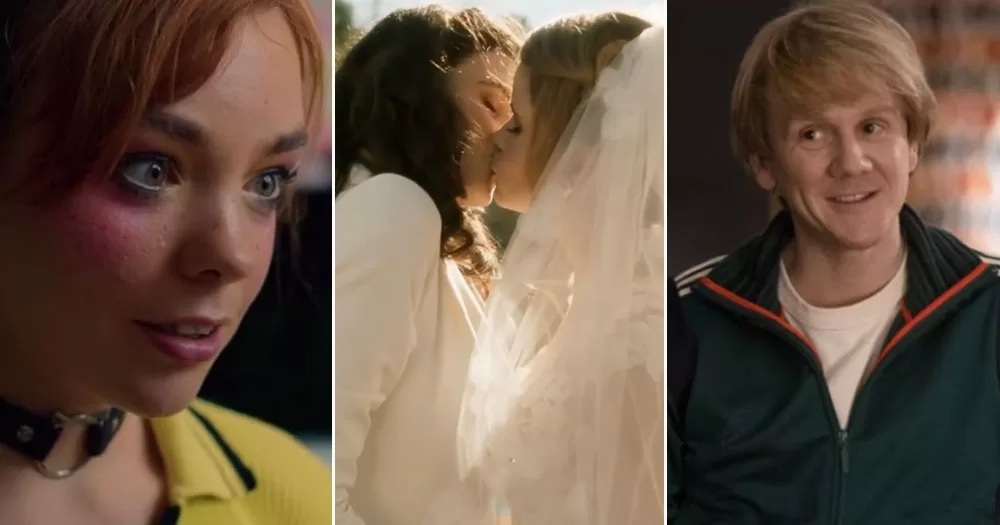Traditionally, representations of autism in TV and film have been predominantly led by cis heterosexual men, such as the character of Raymond (played by Dustin Hoffman) in Rain Man (1988) and Arnie (played by Leonardo DiCaprio) in What’s Eating Gilbert Grape (1993). However, this trope is slowly beginning to change with more female, gender non-conforming, and openly queer autistic characters being scripted.
Here are a few of our favourites to give you a taste of the more realistic representations available.
Quinni (Heartbreak High)
Queer fans of the 1994 Australian high school drama series Heartbreak High won’t be disappointed by the LGBTQ+ representation in the 2022 Netflix reboot.
One of the show’s central characters, the openly lesbian Quinni, is also autistic. Described as “all literal and lateral, a brain trying to connect to a body and a heart”, she has mastered the art of masking.
Played by Chloe Hayden, Quinni’s storyline shows her coping with social anxiety and overcoming her challenges by sharing her autistic experiences with her friends.
it’s officially heartbreak high season 2 month, so i’m bringing back the quinni fancam that i lost when my last account was sniped ? 11 days until my lesbian angel is BACK pic.twitter.com/seSiQLTApy
— amy (@wlwmisspiggy) April 1, 2024
Nicholas Moss (Everything’s Gonna Be Okay)
Also, hailing from Australia, openly gay comedian and host of the podcast How To Be Gay Josh Thomas is fast leading the way in scripting genuine queer autistic representation.
Having been diagnosed as autistic in 2021, at the age of 33, he has already scripted neurodivergent characters into both of his hit comedy series Please Like Me (2013) and Everything’s Gonna Be Okay (2018).
In the latter, Thomas plays the show’s lead character, Nicholas Moss, an entomologist who visits his American father in Los Angeles. When his father reveals that he is terminally ill, he asks Nicholas to become the guardian of his teenage half-sisters.
In the second season of the show, Nicholas’s often unstable behaviour is explained when he receives an autism diagnosis.
nicholas from everything’s gonna be okay is autistic!
(canon) pic.twitter.com/Y3pFB4zAJS— autistic character archive (@archiveautistic) January 20, 2022
Matilda and Drea (Everything’s Gonna Be Okay)
Alongside Nicholas’ character, one of his younger twin half-sisters, Matilda, is also autistic. Kayla Cromer plays Matilda, making her the first autistic actor to play a neurodivergent character in a main role.
As an added bonus, one of the key storylines of Everything’s Gonna Be Okay is the queer romance with fellow autistic character Drea, also played by a neurodivergent actor, Lillian Carrier. Their relationship is polyamorous and asexual, making it one of the most groundbreaking roles for a queer autistic character in TV history.
Today’s canon sapphic couple is Matilda (she/her) and Drea (she/her) from Everything’s Gonna Be Okay ? pic.twitter.com/GwVNuE63sD
— Sapphic Couple of the Day ? (@sapphiccouples) March 15, 2022
Hannah (Please Like Me)
For the second season of his hit show, Please Like Me, Thomas teamed up with fellow Australian comedian Hannah Gadsby to devise the show’s eponymous character. The character, who suffered from severe depression, remained a regular role for the subsequent three seasons.
Whilst not specifically written as autistic, Hannah displayed many autistic traits, which were ably scripted by both Gadsby and Thomas due to their own latently diagnosed autism.
Temple Grandin (Temple Grandin)
The final character on our list is from a biographical drama about real-life autistic activist Temple Grandin.
The film tells the triumphant story of how Grandin overcame struggles in her youth to become a leading academic responsible for revolutionising the humane handling of livestock.
Whilst Grandin has never identified her sexuality, she has remained celibate throughout her life and has stated, “The part of other people that has emotional relationships is not part of me”.
© 2024 GCN (Gay Community News). All rights reserved.
Support GCN
GCN is a free, vital resource for Ireland’s LGBTQ+ community since 1988.
GCN is a trading name of National LGBT Federation CLG, a registered charity - Charity Number: 20034580.
GCN relies on the generous support of the community and allies to sustain the crucial work that we do. Producing GCN is costly, and, in an industry which has been hugely impacted by rising costs, we need your support to help sustain and grow this vital resource.
Supporting GCN for as little as €1.99 per month will help us continue our work as Ireland’s free, independent LGBTQ+ media.
